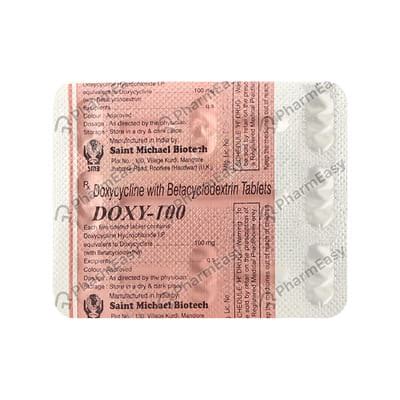Intro
Discover Doxy medicine, a type of antibiotic, and its uses in treating infections, including Lyme disease, acne, and respiratory issues, with Doxycycline as its key component.
The importance of understanding various medications and their uses cannot be overstated. In the vast array of pharmaceuticals available today, each serves a unique purpose, addressing different health conditions. Among these, Doxy medicine, commonly known as Doxycycline, stands out for its broad applications in treating various bacterial infections. It's crucial for individuals to be informed about such medications, their benefits, potential side effects, and the conditions they treat. This knowledge empowers patients to ask the right questions, adhere to treatment plans, and maintain open communication with healthcare providers.
Doxycycline is an antibiotic that falls under the class of tetracyclines. It works by inhibiting protein synthesis in bacteria, thereby preventing the bacteria from multiplying and eventually leading to their death. This mechanism of action is effective against a wide range of bacterial infections, making Doxy medicine a versatile tool in the medical arsenal. Its applications span from treating respiratory tract infections to certain sexually transmitted diseases, and even some infections caused by ticks and lice.
The versatility and effectiveness of Doxy medicine have made it a staple in many healthcare settings. However, like all medications, it's essential to use Doxycycline under the guidance of a healthcare professional. Misuse or overuse of antibiotics can lead to antibiotic resistance, a growing concern globally. As such, understanding the proper use, benefits, and limitations of Doxy medicine is crucial for both healthcare providers and patients. By doing so, we can ensure that this valuable medication remains effective for generations to come.
What is Doxy Medicine Used For?

Doxy medicine, or Doxycycline, is used to treat a variety of bacterial infections. These include but are not limited to acne, urinary tract infections, intestinal infections, and certain sexually transmitted diseases. Its broad-spectrum activity makes it a preferred choice for treating infections where the causative agent is not yet identified. Additionally, Doxycycline is used as a prophylactic measure against malaria in travelers visiting areas where the disease is prevalent. It's also effective against infections caused by certain types of ticks and lice, showcasing its versatility in addressing various health challenges.
Benefits of Doxy Medicine
The benefits of Doxy medicine are multifaceted. Firstly, its effectiveness against a broad range of bacterial infections makes it a valuable option for treating various conditions. Secondly, it is generally well-tolerated, with most patients experiencing mild or no side effects. Doxycycline is also relatively inexpensive compared to other antibiotics, making it an accessible treatment option for many individuals. Furthermore, its ability to be used in both children and adults, under proper medical guidance, expands its utility in healthcare settings.How Does Doxy Medicine Work?

Doxy medicine works by inhibiting protein synthesis in bacteria. It binds to the bacterial 30S ribosomal subunit, which is essential for the translation of mRNA into proteins. By preventing protein synthesis, Doxycycline effectively stops the growth and replication of bacteria, leading to their eventual death. This mechanism is bacteriostatic, meaning it inhibits bacterial growth rather than directly killing the bacteria. However, the host's immune system can then clear the infection.
Steps to Take Doxy Medicine
To ensure the effectiveness of Doxy medicine and minimize the risk of side effects, it's crucial to follow the prescribed dosage and administration instructions. Here are some steps to consider: - Always take Doxycycline with a full glass of water to prevent esophageal irritation. - The medication should be taken on an empty stomach, 1 hour before or 2 hours after meals, to enhance absorption. - Avoid taking Doxycycline with dairy products or mineral supplements, as these can reduce its absorption. - Complete the full course of treatment, even if symptoms improve before finishing the medication, to prevent the development of antibiotic-resistant bacteria.Side Effects of Doxy Medicine

Like all medications, Doxy medicine can cause side effects, although not everyone who takes Doxycycline will experience them. Common side effects include:
- Nausea and vomiting
- Diarrhea
- Stomach upset
- Headache
- Sun sensitivity
More severe but less common side effects can include:
- Allergic reactions
- Increased risk of yeast infections
- Tooth discoloration in children
- Interactions with other medications
It's essential to discuss any concerns or side effects with a healthcare provider, as they can provide guidance on managing these effects or adjusting the treatment plan if necessary.
Precautions and Warnings
When taking Doxy medicine, several precautions and warnings should be considered: - **Pregnancy and Breastfeeding:** Doxycycline can affect fetal development and is generally avoided during pregnancy. It can also pass into breast milk, so caution is advised for breastfeeding mothers. - **Antibiotic Resistance:** Overuse or misuse of Doxycycline can lead to antibiotic resistance, reducing its effectiveness against future infections. - **Sun Sensitivity:** Patients taking Doxycycline may experience increased sensitivity to the sun, increasing the risk of sunburn. Protective measures, such as sunscreen and avoiding prolonged sun exposure, are recommended. - **Interactions with Other Medications:** Doxycycline can interact with various medications, including antacids, blood thinners, and certain vitamins. Patients should inform their healthcare provider about all medications they are taking.FAQs About Doxy Medicine

What is Doxy medicine used for?
+Doxy medicine, or Doxycycline, is used to treat various bacterial infections, including acne, urinary tract infections, and certain sexually transmitted diseases.
How does Doxy medicine work?
+Doxy medicine works by inhibiting protein synthesis in bacteria, preventing their growth and replication, and ultimately leading to their death.
What are the common side effects of Doxy medicine?
+Common side effects include nausea, diarrhea, stomach upset, headache, and increased sun sensitivity. More severe side effects can include allergic reactions and interactions with other medications.
Conclusion and Final Thoughts

In conclusion, Doxy medicine is a valuable antibiotic with a broad range of applications in treating bacterial infections. Its effectiveness, combined with its relatively low cost and accessibility, makes it a preferred choice for many healthcare providers. However, like all medications, it must be used responsibly and under medical guidance to minimize side effects and prevent antibiotic resistance. By understanding the benefits, working mechanisms, and potential side effects of Doxy medicine, individuals can make informed decisions about their health and engage in productive discussions with healthcare professionals.
We invite readers to share their thoughts and experiences with Doxy medicine in the comments below. Your insights can help others better understand the uses and implications of this medication. If you found this article informative, consider sharing it with others who might benefit from this knowledge. Together, we can foster a community that values informed healthcare decisions and responsible medication use.
